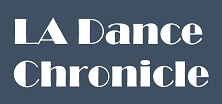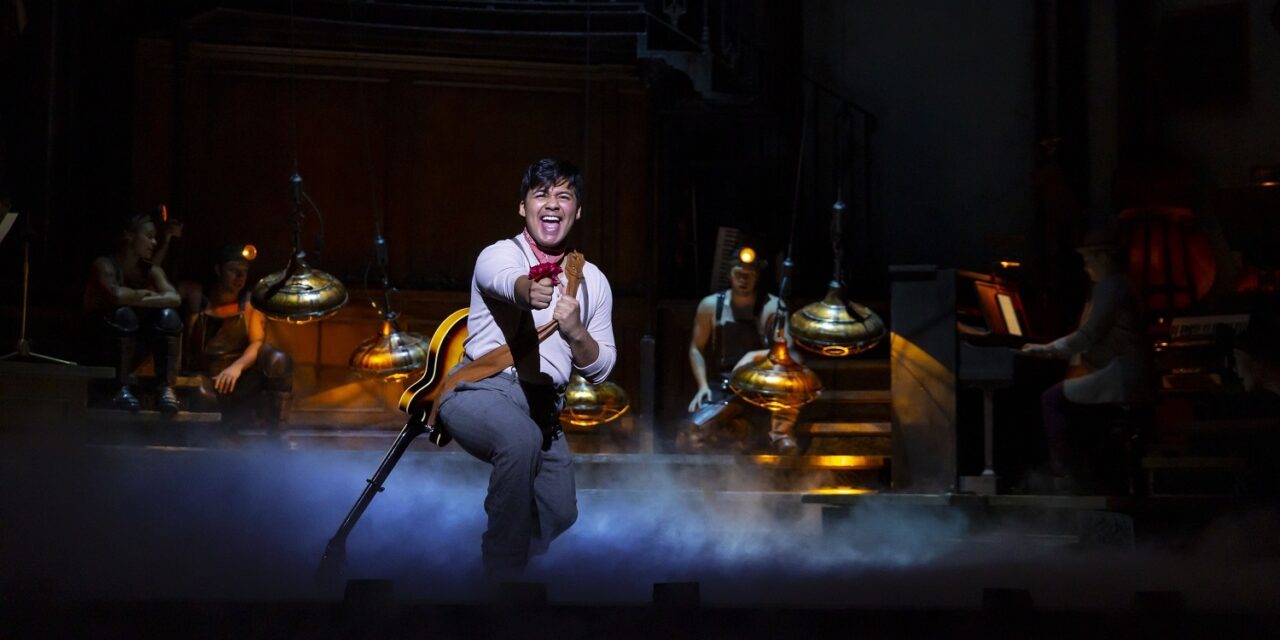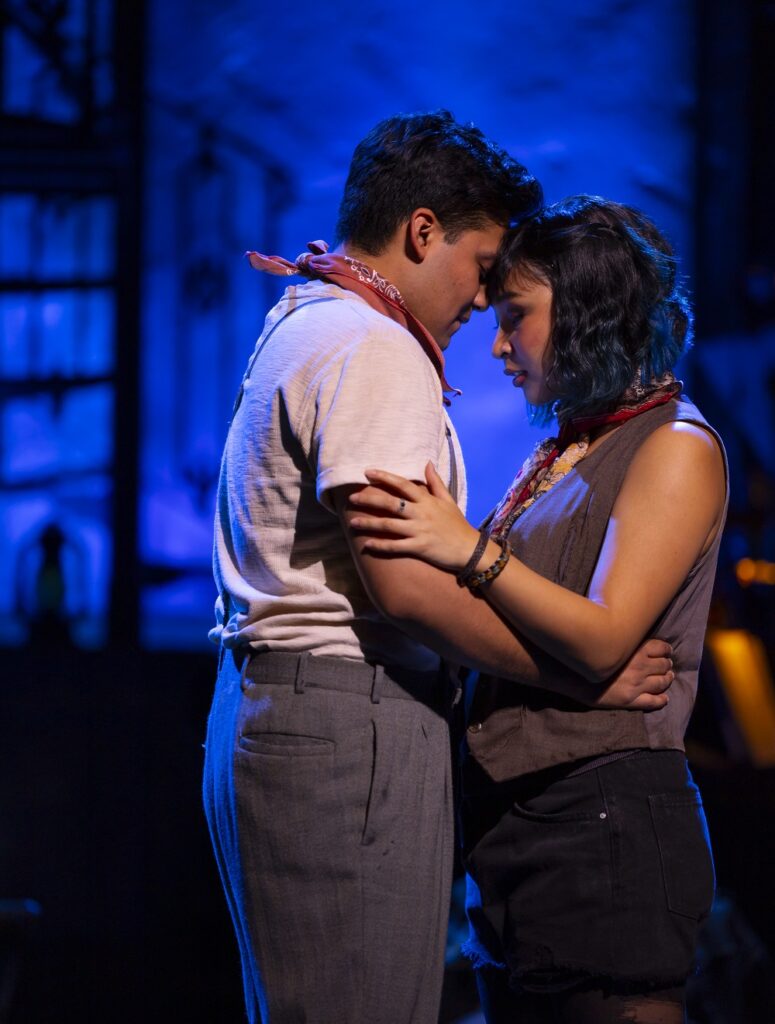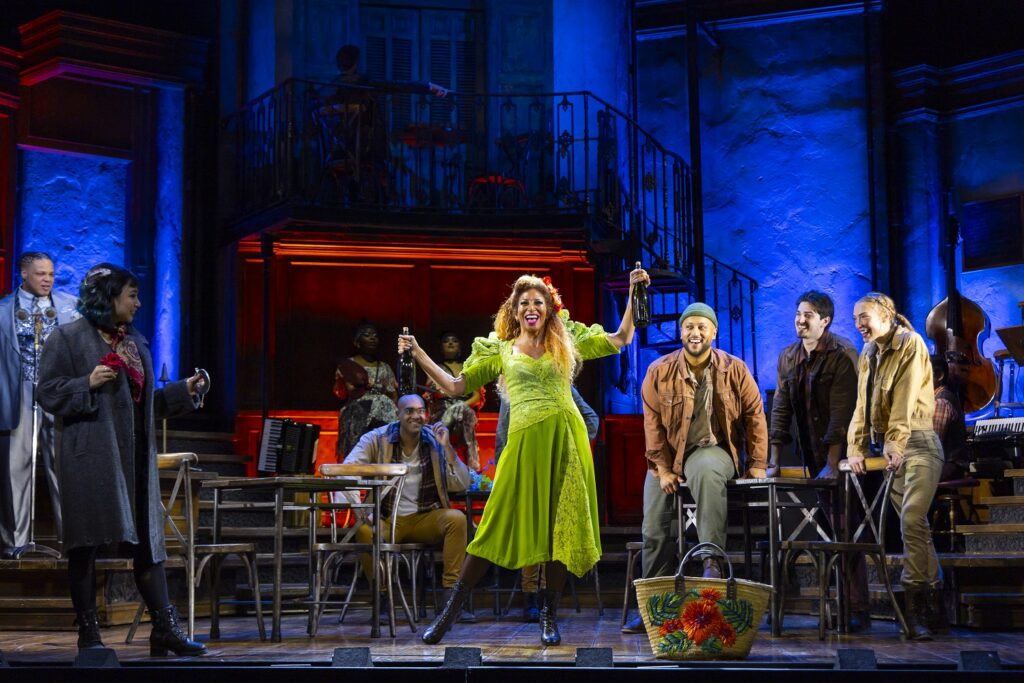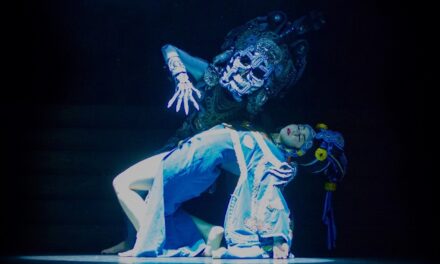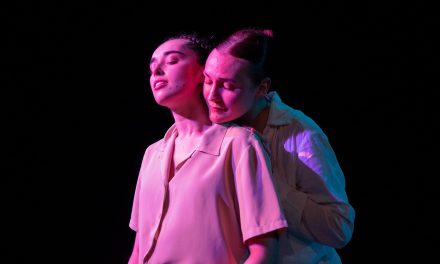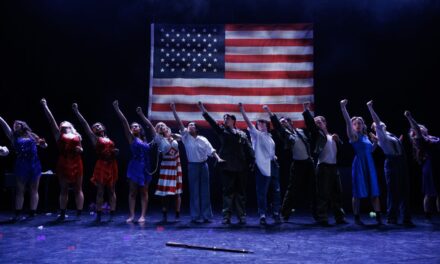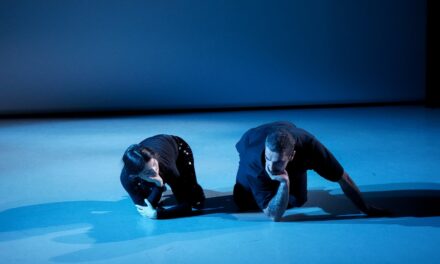A tale as old as time indeed. That is certainly the great love story/tragedy of Orpheus and Eurydice. It is also paralleled in the older saga of Hades and Persephone with a few twists. An updated take on this ancient myth was due. Any attempt would be daunting, and it is to the credit of Anaïs Mitchell who is responsible for music, lyrics and book that we have it. This musical is an engaging retelling and updated re-imagining of the Orpheus/Eurydice myth, and if you do not know, or care about Greek Mythology, you will love this show.
The stage is set in a half-circle with a two-story balcony focused center stage with a spiral staircase running down to the deck. Stage right and left are raised platforms where the musicians sit and comment on the action through their voices/instruments. There are a few tables and chairs spread around to give the area the impression of a way station where old and new souls intermingle. Scenic Design by Rachel Hauck is evocative of a New Orleans’ music club and serves its various functions very well. The decor is dark, the lighting dramatic, which suits the subject matter admirably. Bradley King as lighting designer works magic in many scenes from the isolated down spot on a solo by Eurydice, to the swinging lamps barring the way for Orpheus. It is a soft and stark lighting plot that helps bring the story home to the audiences of today. In the second act it becomes somewhat brash bordering on Rock Concert and while I do not like stage lights in my eyes as an audience member, it certainly curtailed anyone looking at their phone.
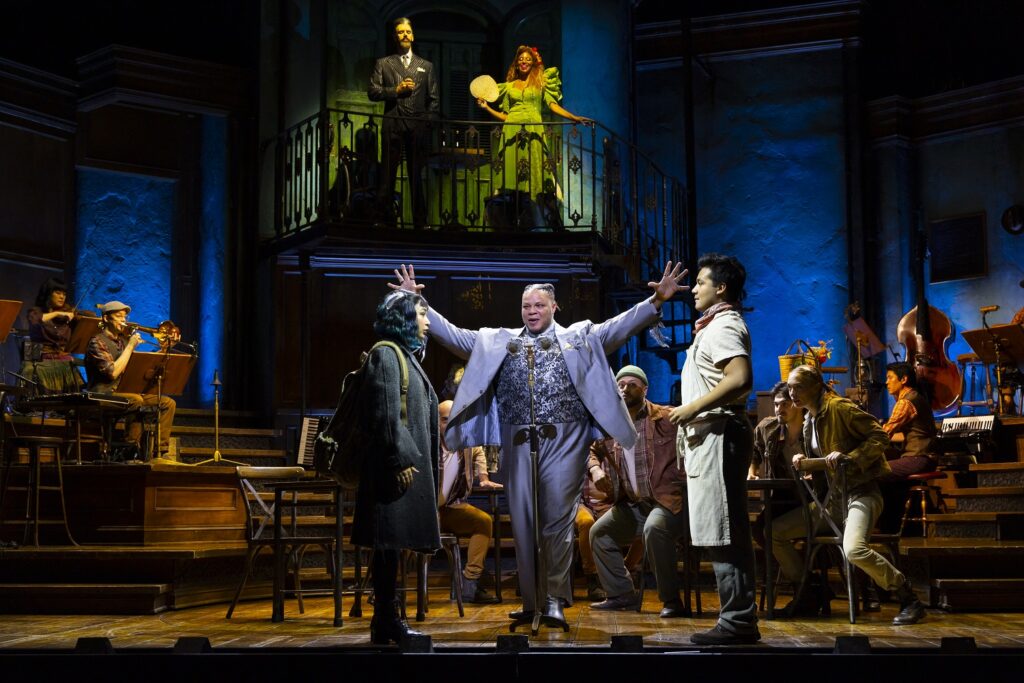
(from top left clockwise) Matthew Patrick Quinn, Lana Gordon, J. Antonio Rodriguez, Will Mann, Amaya Braganza and company in the Hadestown – Photo by T Charles Erickson.
The train way station was matched by a ‘Steampunk’ design of Hades environment. As a way of balancing Persephone’s character as the daughter of Mother Nature herself (Demeter), it makes sense. However, Hades himself is not steampunk. He is oddly reminiscent of one of Ayn Rands’ industrialists who single-handedly revolutionize the world through factory workers idolizing machinery as the sole progressive measure of humanity. Here Matthew Patrick Quinn does a magnificent job of embodying say, Hank Rearden from ‘Atlas Shrugged,’ rather than Hades, God of the underworld. This is not the fault of Mr. Quinn. His basso profundo is spectacular and lends every bit of serious gravity to the role. Rather it is the writing when Hades waxes poetic about his metal, or the neon lights he has created to rival the sun underground.
He has an inexplicable song “Why we build the wall” at the end of the first act that is more a paean to Mussolini, or Big Brother in “1984” than having anything to do with Hades, God of the underworld. This song accompanies the workers building a wall around Hadestown and proclaims that ‘building the wall makes us free.’ The last time I saw/heard that was at the gates of Auschwitz, “Arbeit macht frei” (work sets you free), coincidence?
There are descriptions from a few who made it there and back again, Odysseus, Hercules, and of course Orpheus, and not all residents were being tortured. The Elysian Fields are in the underworld, “full of meadows, groves, sunlight, and fresh air.” Elysium means blissful, delightful. There is reward as well as punishment. To ignore this mars this production by relegating Hades the God to a mere tyrant while it is obvious that for Persephone to be in love with him there must be so much more to his character than industrial corporate greed. Quinn manages to rise above his role and delivers some humor and majesty to the production.
Orpheus and Eurydice are played by J. Antonio Rodriguez and Amaya Braganza respectively and they bring all of the innocent naiveté necessary to believe their predicament. They were wonderful in their roles and utterly believable as the couple doomed to Fate. It is unclear as to how and why Eurydice dies. She is starving and cold and so signs a contract with Hades. Ostensibly this means she has died and gone to the underworld, but her death is never made clear.
Hermes, played by Will Mann is entirely engaging and, as the Master of Ceremonies, impeccable. He is clear, precise and fully invested in every movement and nuance of his character. A perfect complement to him is Lana Gordon as Persephone. She shows all of the bounty of Persephone with that undertone of sadness so principle to her character. She is lively and full of color and then bawdy and full of life. All of the voices in the show were fabulous and lacked nothing in revealing their characters.
The Three Fates were well represented and modelled after the Andrew Sisters it seems. Their voices were lovely and most of their numbers were jazz based. Oddly, instead of impartial judges as they hand out different fates to various humans, they were more often acting like Harpies in their abuse and harassment of Orpheus and Eurydice. Well-acted by Marla Louissaint, Lizzie Markson, and Hannah Schreer, it was not possible to tell which was Clotho, Lachesis, or Atropos.
The Greek chorus really moves the show along. They are instrumental in every scene. They easily handle the Choreography by David Neumann and could have sustained a bit more challenge in that department. They are: Sevon Askew, Jamal Lee Harris, Courtney Lauster, Daniel Tracht, Racquel Williams.
While the singing and acting and story are engaging and entertaining, there are many themes in this show which make it a bit confusing. Is it the individual against society a la Ayn Rand when Orpheus infiltrates Hadestown? Is it the mechanization of society versus nature as Hades’ objective? Is it Orpheus as Karl Marx inciting the proletariat of Hadestown to revolt? Is it merely a jazz club in the Big Easy as background to a love story? Is it Big Brother in ‘1984’ telling the population to sacrifice for the common good? It is all of the above, a hodge-podge of human issues with only the single thread of love to tie them all together.
Hadestown runs through October 15, 2023 at the Ahmanson Theatre. For more information about Central City Group, the Ahmanson Theatre, and to purchase tickets, please visit their website.
Written by Brian Fretté for LA Dance Chronicle.
Featured image: Photo by T Charles Erickson
